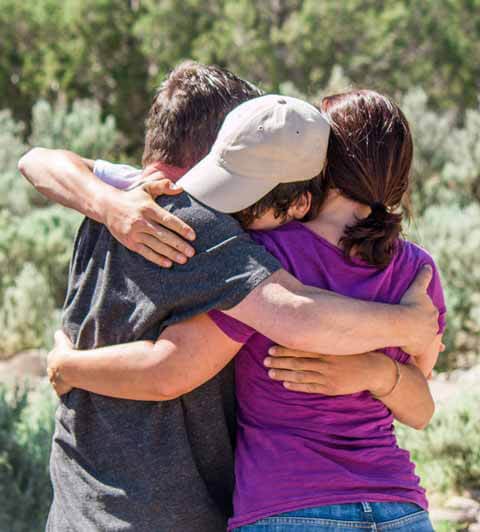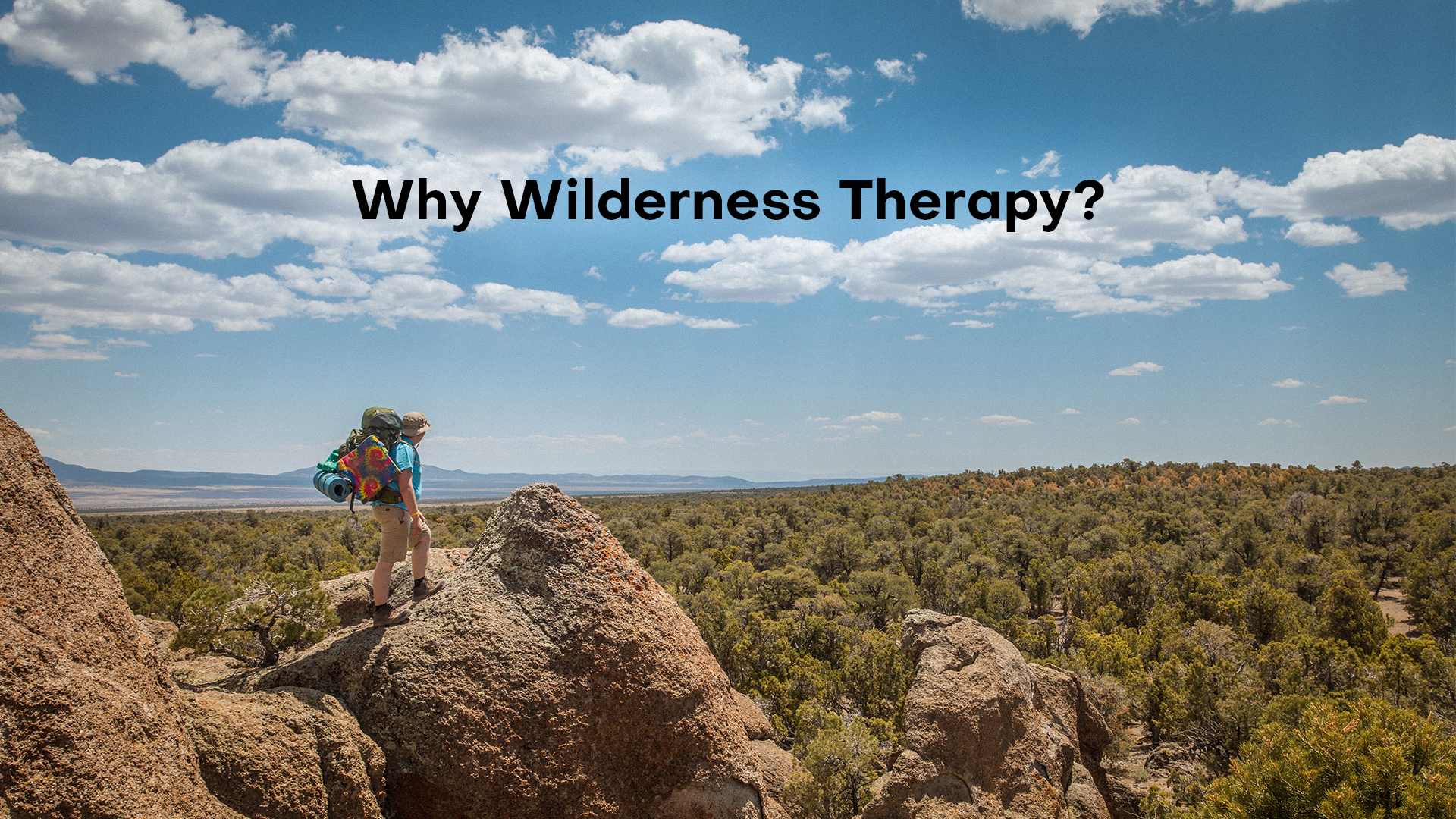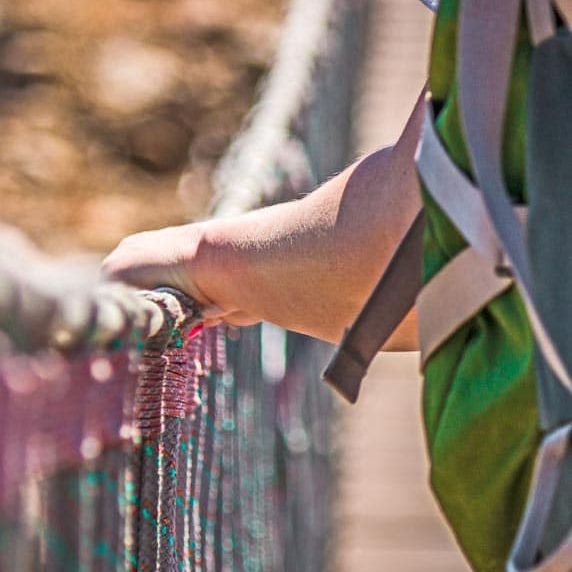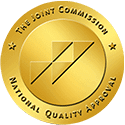
Breaking Free: A Parent's Guide to Treatment for Codependency in Teens
Is your teen's codependency getting in the way of their success and happiness?? Our wilderness therapy program offers unique and effective treatment for codependency that empowers teens to take charge of their own lives. Our program leverages the healing power of nature in combination with individual and family counseling to equip teens with the tools they need to overcome their codependent patterns and achieve their goals.
Take our teen assessment and see if a wilderness therapy program is right for your family.
Are you tired of seeing your teen struggle with codependency, unable to break free from the chains that are holding them back? If so, then it's time to take action and get your teen treatment for codependency today!
Our wilderness program is specifically designed to help teens overcome codependency and achieve their full potential. Our team of experts combines the latest evidence-based therapies with the healing power of nature to create a unique experience that's both transformative and empowering. From outdoor adventures to individual and family counseling, we provide the support and guidance that your teen needs to take control of their life and build a brighter future.
In this article, we'll explore what codependency is, the different types of codependency, how to recognize the signs, and what the effects of leaving it untreated can be. We'll also provide some helpful tips on how parents can support their teen and why wilderness therapy is an excellent choice for families looking to break free from the chains of codependency and build a brighter future. So, let's get started!
What is Codependency?
Codependency in teenagers often stems from taking on an excessive amount of responsibility in a relationship and perceiving the other person as unable to function without them. This can involve taking on excessive responsibility for the other person's emotions and actions, sacrificing one's freedom, and assuming a caretaker role at the expense of one's own needs. In a codependent relationship, a teen's focus on the other person often becomes so intense that they suppress and disregard their own needs, goals, and interests.
Codependent teens may base their self-worth on helping and rescuing others, which can lead to an unhealthy imbalance in their relationships. Maintaining a codependent relationship requires each person to play their assigned part: one as the "overfunctioner" providing support, the other as the "underfunctioner" receiving that support.
“What’s a codependent? The answer’s easy. They’re some of the most loving, caring people I know.”
Types of Codependency in Teenage Relationships
Codependency in teens can manifest in various ways, but some common types of codependency seen in this age group include:
- Caretaking codependency: This is the most common type of codependency seen in teens, where they feel responsible for other people's feelings and actions, even when it is not their place to do so.
- Enabling codependency: In this type of codependency, the teen may enable or cover up for the other person's negative behavior, thereby perpetuating the cycle of dependence.
- Compliance codependency: In this type of codependency, the teen goes along with the other person's wishes, even if it is detrimental to their own well-being or values.
- Control codependency: This type of codependency is characterized by a need to control or manipulate the other person's behavior or emotions, often to avoid feeling anxious or out of control.
It's important to note that these types of codependency are not mutually exclusive, and a person may exhibit multiple types of codependency at different times or in different relationships.
Signs of Codependency in Teens
As a parent, it can be difficult to know if your teenager is struggling with codependency. However, recognizing the signs of codependency is an important step toward helping your child.
The signs of codependency can be grouped into five different categories of behavior patterns, which include denial, compliance, low self-esteem, control, and avoidance. Here are some things to look for:
Denial Patterns
Your teen may...
- Struggle to identify and express their own feelings
- Minimize, deny or change their true emotions
- Believe they are completely selfless and only focused on the well-being of others
- Lack empathy for others' feelings and needs
- Label others with negative traits
- Think they can handle everything on their own, without help from others
- Use anger, humor, or isolation to mask their pain
- Express negativity or aggression indirectly and passively
- Be attracted to people who are emotionally unavailable
Compliance Patterns
Your teen may...
- Remain loyal in harmful situations for too long
- Compromise their values and integrity to avoid rejection or anger
- Put aside their own interests to please others
- Be very attentive to others' feelings, often taking them on as their own
- Be afraid to express their beliefs, opinions, and feelings when they differ from those of others
- Accept sexual attention when they actually want love
- Make decisions without considering the consequences
- Give up their truth to gain the approval of others or to avoid change
Low Self-Esteem Patterns
Your teen may...
- Struggle to make decisions
- Judge themselves harshly and feel like they are never good enough
- Be embarrassed to receive recognition, praise, or gifts
- Value others’ approval of their thoughts, feelings, and behavior over their own
- Feel like they are not lovable or worthy
- Seek recognition and praise to compensate for feeling inadequate
- Find it difficult to admit a mistake
- Need to appear right in the eyes of others, and even lie to look good
- Struggle to identify and express their own needs and wants
- Believe they are superior to others
- Look to others to feel safe and secure
- Have trouble meeting deadlines and completing projects
- Struggle to set healthy priorities and boundaries
Control Patterns
Your teen may...
- Believe that people are incapable of taking care of themselves
- Try to convince others what to think, do, or feel
- Offer unsolicited advice and direction
- Become resentful when others decline their help or reject their advice
- Use gifts and favors to influence people
- Use sexual attention to gain approval and acceptance
- Need to feel needed to have a relationship with others
- Demand that their needs be met by others
- Use charm and charisma to convince others of their caring and compassionate nature
- Use blame and shame to emotionally manipulate others
- Refuse to cooperate, compromise, or negotiate
- Adopt an attitude of indifference, helplessness, authority, or rage to manipulate outcomes
- Use recovery jargon in an attempt to control the behavior of others
- Pretend to agree with others to get what they want
Avoidance Patterns
Your teen may...
- Behave in ways that invite rejection, shame, or anger from others
- Judge others harshly for their thoughts, feelings, or actions
- Avoid emotional, physical, or sexual intimacy as a way to maintain distance
- Use addictions to people, places, and things to distract from achieving intimacy in relationships
- Use indirect or evasive communication to avoid conflict or confrontation
- Decline to use recovery tools and, as a result, limit their ability to have healthy relationships
- Suppress their feelings or needs to avoid feeling vulnerable
- Pull people close, then push them away when they get too close
- Refuse to give up their self-will to avoid surrendering to a power greater than themselves
- Believe that showing emotion is a sign of weakness
- Withhold signs of gratitude or appreciation
Understanding the signs of codependency in your teen can be the first step to getting them the help they need. Now that you know what to look for, let's explore what causes codependency in teens.
“The first priority is to heighten your awareness and open up your thinking and understanding about codependency and how it continues to affect your family and your life.”
What Causes Codependency in Teens?
There are many factors that can contribute to the development of codependency, such as:
- Growing up with a family member who had a mental health disorder: Children who grow up with a parent or sibling with a mental illness may learn to focus solely on the needs of the family member, neglecting their own needs. This can lead to a pattern of behavior where the child becomes a caretaker for others and neglects their own needs, forming codependent relationships later in life. These mental illnesses may include:
- Borderline Personality Disorder (BPD): The loved one of a person with BPD may become codependent and assume a caretaker role within the relationship. This can lead to a pattern of behavior where they neglect their own needs and form codependent relationships in the future.
- Narcissistic Personality Disorder: People with Narcissistic Personality Disorder often seek out codependent individuals who will provide them with an audience and make them feel important. This can cause codependent partners to neglect their own needs and form unhealthy relationships.
- Other mental health conditions: Having family members who may need more accommodations, like those with Attention-Deficit Hyperactivity Disorder (ADHD) or Obsessive Compulsive Disorder (OCD) is also associated with an increased risk of developing codependency.
- Emotional, physical, or sexual abuse: Those who have experienced abuse as children may have learned to suppress their own feelings and needs as a coping mechanism. This can lead to a pattern of behavior where they focus solely on the needs of others, neglecting their own, and forming codependent relationships.
- A family member struggling with a physical illness: Children who care for ill parents or siblings may develop a pattern of behavior where they prioritize the needs of others over their own. This can lead to a habit of forming codependent relationships later in life.
It's important to remember that even if a teen enjoys helping others and being a caretaker, this can quickly become unhealthy. Codependency can cause the other person in the relationship to become overly reliant on the caretaker, making it difficult for them to leave. This can cause immense distress to the caretaker, and prevent them from meeting their own needs and forming healthy relationships.
You Are Not Alone
RedCliff Ascent is there for you and your family.
Importance of Early Intervention & Treatment for Teenage Codependency
Early intervention is important when treating codependency in teens because
- it can prevent the codependent behaviors from becoming deeply ingrained and harder to change later in life.
- by addressing the issue in the earlier stages, it is easier to identify the root causes and develop coping strategies that can help teens break the cycle of codependency.
- it also reduces the risk of codependency, avoiding more serious mental health problems in the future.
Addressing the issue early can help teens:
- build healthier relationships with their family, friends, and romantic partners
- improve their self-esteem and sense of self-worth.
- focus more on their own needs and goals
- develop a stronger sense of independence and autonomy.
Overall, early intervention can lead to better long-term outcomes for teens struggling with codependency, and can help them lead happier, more fulfilling lives.
In addition, codependency can have a negative impact on a teen's personal development, relationships, and academic performance.

Not Seeking Treatment for Codependency Can Be Harmful for Teens
Leaving teen codependency untreated can have various short-term and long-term effects on their mental, emotional, and physical well-being, including:
Short-term Effects of Codependency:
- Poor mental health: Teens may experience mental health challenges when they habitually prioritize the needs of others over their own. Additionally, teens may experience high levels of anxiety and depression when they are unable to fulfill the needs of others or when they feel rejected or abandoned by the people they are codependent with.
- Poor academic performance: Codependent teens may struggle with concentration and focus, leading to poor performance in school.
- Relationship issues: Teens may have difficulty forming healthy relationships with peers or romantic partners, as they may continue to engage in codependent behaviors that prevent them from being authentic and vulnerable, two fundamental aspects of healthy relationships.
Long-term effects of codependency:
- Chronic low self-esteem: Teens who struggle with codependency may have difficulty developing a strong sense of self and may continue to struggle with self-esteem issues throughout their lives.
- Mental health disorders: Long-term codependency can lead to the development of mental health disorders such as anxiety disorders, depression, and personality disorders.
- Inability to form healthy relationships: Teens who do not develop healthy interpersonal skills to break their codependent patterns may continue to struggle with forming healthy relationships in adulthood, leading to isolation and loneliness.
- Chronic physical health issues: Prolonged stress and emotional turmoil associated with codependency can lead to chronic physical health problems, such as high blood pressure, heart disease, and digestive issues.
- Stunted Identity Development: Codependency can significantly impact a teen's identity development. When a teen's sense of self is tied to taking care of others, they may struggle to develop a clear sense of self-identity, values, and beliefs. Instead, they may prioritize the needs of others over their own and struggle to recognize their own needs and wants. This can lead to feelings of confusion, low self-esteem, and a lack of direction in life.
Teens who struggle with codependency may have difficulty establishing a sense of independence and making decisions for themselves. They may struggle with assertiveness and boundary-setting, leading to feelings of resentment and frustration in their relationships. This can lead to difficulties in forming meaningful connections with others and can affect their ability to develop a healthy self-identity.
It is important to seek treatment for teen codependency as soon as possible to prevent these short-term and long-term effects from taking hold.
“Codependents still experience churning emotions. Predominant are anger and resentment and mood swings from fear and anxiety to hopelessness and despair. All of this stress over time leads to depression, which is a lack of feeling.”
Early Intervention Benefits the Whole Family
Early intervention and treatment for codependency in teens can have significant benefits for parents and families, including:
- Improved parent-child relationships: With the guidance and support of mental health professionals, parents can learn how to better support their teen and establish healthy boundaries. As a result, they may see improvements in their relationship with their teen, including increased trust and communication.
- Reduced stress and anxiety: Parenting a codependent teen can be incredibly challenging and emotionally draining. By seeking early intervention and treatment, parents can learn coping strategies and develop a support system that can help reduce stress and anxiety.
- Improved family dynamics: Codependency can have a ripple effect on the entire family, leading to strained relationships and conflicts. By addressing codependency early on, families can work together to establish healthier communication patterns and develop a stronger, more supportive family dynamic.
- Increased awareness and understanding: Early intervention and treatment can help parents and families better understand the root causes of codependency and how to recognize and address it in the future. This can lead to increased empathy and understanding for their teen and others who may struggle with codependency.
- Increased self-awareness: As parents work with mental health professionals to support their teen, they may also gain a deeper understanding of their own patterns of behavior and communication. This increased self-awareness can help parents establish healthier boundaries and improve their own relationships, both within the family and in their personal lives.
By seeking early intervention and treatment for their teen's codependency, parents can not only help their teen but also experience a range of benefits that can positively impact the entire family.
Codependency Treatment Options for Teens
There are several options available to parents who are seeking codependency treatment for their teenager. These include:
- Outpatient therapy: This type of therapy involves meeting with a therapist on a regular basis, typically weekly or biweekly, to address codependency issues. It can be a good option for teens who are able to maintain their daily routines while receiving treatment.
- Community-based programs: These programs may include support groups or other community resources that focus on helping teens with codependency issues. They can be a good option for teens who may benefit from peer support or who may not require more intensive treatment.
- Residential treatment: This type of treatment involves a teen staying at a treatment center for an extended period of time, typically ranging from a few weeks to several months. Residential treatment can provide a highly structured and supportive environment for teens to work on their codependency issues.
- Wilderness therapy: This type of therapy involves taking teens out of their familiar environment and placing them in a wilderness setting, where they can work on their codependency issues in a therapeutic and supportive environment. Wilderness therapy can be a good option for teens who may benefit from experiential learning and the challenge of being in a wilderness setting.
Choosing the right type of treatment for a teen with codependency issues can be a difficult decision for parents. It's important to consider the severity of the teen's codependency, as well as their individual needs and preferences, when making this decision. Working with a mental health professional can help parents identify the best treatment options for their teenager.
“Recovery from codependency doesn’t necessitate ending a relationship to become independent. The goal is to be able to function better and more independently in the relationship.”
What is Wilderness Therapy?
Wilderness therapy is a type of codependency treatment for teens that uses nature, wilderness activities, and therapy as a means to address and heal codependent patterns in teens. Wilderness therapy takes full advantage of the outdoors and its ability to foster change. The outdoors provide teens with a contrasting environment to observe aspects of themselves that are often overlooked in traditional talk therapy.
As the leader in wilderness therapy, RedCliff Ascent is an effective treatment program for struggling teens aged 13-17. RedCliff Ascent’s safe, nurturing, and supportive environment provides teens with the skills they need to cope in a healthy and age-appropriate way.

“Your codependent [teen] will fight change tooth and nail to stop your progress. [They] need continual support and self-awareness to prevent slipping backwards. Perseverance pays off. The best help comes from people experienced with codependency, whether it comes in the form of a [treatment] program, counselor, or psychotherapist.”
Benefits of Wilderness Therapy for Codependent Teens
Being immersed in nature can have a profound impact on a teenager. It improves their mental, emotional and physical health. When combined with a trusted clinical approach, a therapeutic wilderness experience helps heal codependency in teens. Here are five specific benefits your family can expect to see while your teen is in wilderness therapy.
Studies have shown that accurate mental health assessments can help identify the root of your teen's codependency, leading to a 20% decrease in the time required for effective treatment.
Wilderness therapy provides a novel and challenging environment that disrupts the unhealthy patterns that cause your teen's codependency or are a result of your teen's codependent behaviors.
Codependent teens often struggle to engage in ongoing treatment and have very high dropout rates. Poor engagement may lead to worse clinical outcomes, with symptom relapse and rehospitalization. Our research shows that even teens who have been resistant to therapy engage in the process while in wilderness therapy.
RedCliff Ascent’s safe, nurturing, and supportive environment provides teens with the social and emotional learning skills they need to re-engage in healthy development.
If you're like most parents, you don't want to just get rid of your teen's codependency. You want them to eventually become thriving, independent adults equipped with the skills necessary to succeed outside your home. Wilderness therapy heps teens develop these skills, including:
Resilience - the ability to successfully adapt to challenging situations despite risk and adversity. Resilience helps us develop social competence, problem-solving skills, critical consciousness, autonomy, and a sense of purpose.
Leadership & Social Competence skills include qualities such as:
- responsiveness, especially the ability to elicit positive responses from others
- flexibility
- empathy
- communication skills
- and a sense of humor
Problem-solving skills - the ability to plan; to be resourceful in seeking help from others; and to think critically, creatively, and reflectively.
Autonomy is having a sense of one’s own identity and an ability to act independently and to exert some control over one’s environment, including a sense of task mastery, internal locus of control, and self-efficacy. The development of resistance (refusing to accept negative messages about oneself) and of detachment (distancing oneself from dysfunction) serves as a powerful protector of autonomy.
Sense of Purpose and a belief in a bright future, including goal direction, educational aspirations, achievement motivation, persistence, hopefulness, optimism, and spiritual connectedness.
98% of students report feeling connected to RedCliff's staff and one or more of their peers.
Upon completion of the program, 86% of parents reported improvement in their child's problems when compared to when they entered
12 months after treatment 86% of parents reported that their child's problems are improved since they completed treatment
How Does Wilderness Therapy Work?
RedCliff Ascent has helped codependent teenagers for almost 30 years and has conducted research since its inception. Through our research, we have identified seven principles that actually make a difference in helping your whole family recover from your teen's codependency issues.

Healthy relationships are not only the foundation for growth and development but the launchpad for a successful future as well.
Your teen will live in a small group where social influence and feedback can be given and received in a safe and supportive way. This safe environment teaches your teen to build healthy relationships with both their peers and mentors. Having the skills to make and keep healthy relationships is essential to overcoming codependency.
Codependency treatment for teens is most effective when it is responsive to your teen’s specific struggles, strengths, personality, sociocultural context, and preferences. Our evidence-based treatment approach combines decades of research and clinical expertise to personalize a treatment plan that fits your teen’s unique struggles, characteristics, culture, and preferences.
At RedCliff Ascent, we have found that a challenging and novel environment can be transformative for teens struggling with codependency. Through our wilderness therapy program, we provide a safe space where your child can confront their worldview and gain a fresh perspective on their life.
Our approach encourages growth outside of the comfort zone, where teens can push themselves both physically and mentally. By doing so, they can experience personal growth and discover new options available to them, which can be a significant step towards developing healthy relationships and a strong sense of self.
Your teen's codependency didn't develop in isolation, it affects everyone in your family. The healing process should apply to your whole family as well. Parental involvement and family support during treatment greatly increase your teen’s progress in treatment and will help them to adapt after treatment.
Communicating through handwritten letters provides a novel and powerful way to work through your family's struggles. You will also have access to our parent resource library, a weekly support call with other parents like you, as well as a weekly session with your child's therapist.
Your teen's codependency affects every aspect of their life. The best codependency treatment programs must heal every part of their life as well. They use a holistic and integrated approach to heal every aspect of your codependent teen's life. In our treatment program, mentors, therapists, doctors, nurses, academic directors, nutritionists, and everyone on your teen's treatment team will meet together each week to discuss how to best help your child.
Exclusionary criteria for RedCliff Ascent include:
- Teens younger than 13 and older than 17.5
- Teens with a physical limitation, i.e. wheelchair, crutches, etc.
- Teens with conditions that need intensive medical care or monitoring, i.e. eating disorders, diabetes, etc.
- Teens with a history of violence or sexual assault
- Teens with psychosis or schizophrenia
RedCliff Ascent does not take Medicare or Medicaid.
What Our Clients Say About RedCliff Ascent
I’d like to let you know how delighted I am with the RedCliff program and how impressive the hard work and dedication of the staff is...We feel that your program has very probably saved this child’s life and given us back our son.
- Kathy
We are very pleased with [our daughter's] self-improvements. A year ago we would not have dreamed all this to be possible! The path she was headed down was self-destruction. The impact of the RedCliff program is what turned [her] around. Our headstrong daughter was able to take stock of her past behavior, deal with her anger toward us, and begin to move in a more positive direction.
Even though sending her to RedCliff was a gut-wrenching decision, we know we did the right thing. We are thankful for the help and insight you gave to her and us.
- Clark and Irene
Since [our son] went to RedCliff we have all been transformed, but none as much as he. All of his teachers had nothing but good things to say about him. There have been no behavior issues at school this year. As a matter of fact, his teachers stated that they would like it if they had more students like Rob in their classes. I cried again at this meeting, but this time they were tears of joy.
- Julie


Backed by The Joint Commission which ensures programs adhere to the highest quality of clinical and medical practices.

Designated as a NATSAP Research Program, showing our commitment to well-researched practices in our program.

We are also OBH Accredited through the Association of Experiential Education (AEE) which regulates wilderness therapy practices.

Full member of the National Association of Therapeutic Schools and Programs (NATSAP), which ensure regulation of programs that serve children and adolescents.

RedCliff Ascent is fully licensed in the state of Utah.

Backed by the Association of Experiential Education (AEE) that ensures programs maintain appropriate professional behavior and risk management.

Founding member of the OBH Council (Outdoor Behavioral Healthcare Council).

Founding member of Choose Mental Health, guiding families with questions about mental health.
Every teen’s strengths and challenges are different. Complete the no-obligation teen assessment below to help us understand your family’s needs.
We respect your privacy and will never share your information.
We’re here to help - take the first step and contact us to see if wilderness therapy could be the path to healing for your family.
